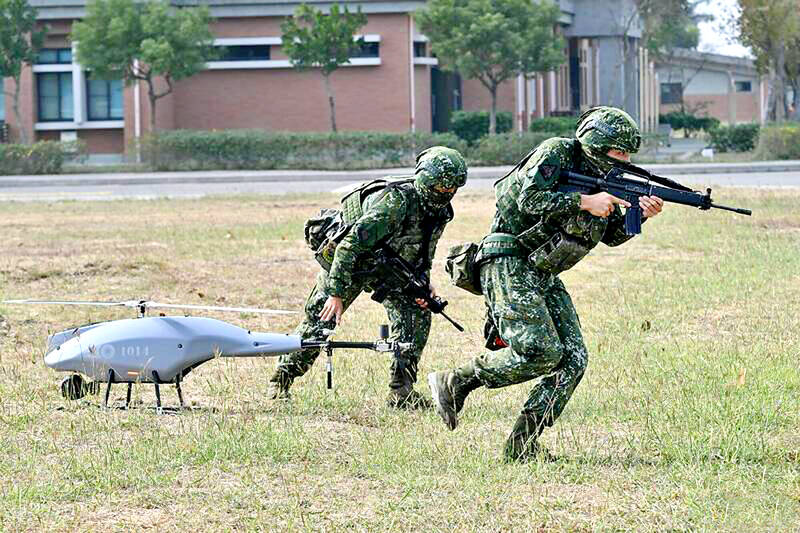The Ministry of National Defense (MND) plans this year to obtain nearly 1,000 drones equipped with artificial intelligence (AI) and machine learning abilities as part of its efforts to bolster the military’s combat capabilities, the ministry said in a report delivered to the Legislative Yuan last week said.
Minister of National Defense Wellington Koo (顧立雄) is today to brief lawmakers at a meeting of the legislature’s Foreign and National Defense Committee on details of the report on the implementation of the Sea-Air Combat Power Improvement Plan Purchase (海空戰力提升計畫採購).
The ministry has included drone development as an important part of military building plans after its wide application was seen in the Azerbaijani offensive in Nagorno-Karabakh last year and Russia’s war in Ukraine which began in 2022.

Photo: Taipei Times file
The Chungshan Institute of Science and Technology, a corporation that is part of the ministry’s Armaments Bureau, has been commissioned to research and develop medium and large-sized military drones and attack drones with military specifications.
The ministry is also working with private contractors to develop commercial drones for use by the military.
The increased use of drones on battlefields has shown their importance in modern warfare, the report says.
Aside from commissioning the Chungshan Institute and private contractors to build drones, the Armaments Bureau and the Ministry of Economic Affairs should discuss ways to shore up defense capabilities by integrating domestic sources and production capacity, and removing influence from the Chinese supply chain, it says.
The report says that the military plans to acquire 968 drones of seven different types this year, including attack drones produced by the Chungshan Institute as well as “second-generation short-range uncrewed aerial vehicles,” and “miniature,” “target acquisition,” “carrier,” “surveillance” and “land” drones purchased from private contractors.
The report also says that the military has taken AI and machine learning technologies into consideration when acquiring drones, such as those with “one-click takeoff,” “autonomous return,” “path planning flight,” “dynamic target tracking,” “coordinate distance calculation” and other capabilities to reduce operator load, flight risks and improve operational efficiency.
Emerging AI technologies would be included in future development plans, it says.
The ministry’s budget assessment report this year showed that it would acquire “target acquisition,” “miniature,” “ship-based,” “surveillance” and “land” commercial drones from this year to 2027, which would increase its total number of drones to 3,231.
The ministry’s budget plan also shows that it is procuring 201 new generation “short-range uncrewed aerial vehicles” jointly developed by the military and private contractors. No public data on the total number of attack drones is available.

Chinese spouse and influencer Guan Guan’s (關關) residency permit has been revoked for repeatedly posting pro-China videos that threaten national security, the National Immigration Agency confirmed today. Guan Guan has said many controversial statements in her videos posted to Douyin (抖音), including “the red flag will soon be painted all over Taiwan” and “Taiwan is an inseparable part of China,” and expressing hope for expedited reunification. The agency last year received multiple reports alleging that Guan Guan had advocated for armed reunification. After verifying the reports, the agency last month issued a notice requiring her to appear and explain her actions. Guan

GIVE AND TAKE: Blood demand continues to rise each year, while fewer young donors are available due to the nation’s falling birthrate, a doctor said Blood donors can redeem points earned from donations to obtain limited edition Formosan black bear travel mugs, the Kaohsiung Blood Center said yesterday, as it announced a goal of stocking 20,000 units of blood prior to the Lunar New Year. The last month of the lunar year is National Blood Donation Month, when local centers seek to stockpile blood for use during the Lunar New Year holiday. The blood demand in southern Taiwan — including Tainan and Kaohsiung, as well as Chiayi, Pingtung, Penghu and Taitung counties — is about 2,000 units per day, the center said. The donation campaign aims to boost

The Kaohsiung Tourism Bureau audited six hotels in an effort to prevent price gouging ahead of Korean band BTS’ concert tour in the city scheduled for Nov. 19, 21 and 22 this year. The bureau on Friday said that the audits — conducted in response to allegations of unfair pricing posted on social media — found no wrongdoing. These establishments included the local branches of Chateau de Chine, Hotel Nikko, My Humble House, and Grand Hai Lai, it said, adding that the Consumer Protection Commission would have penalized price gougers had the accusations been substantiated. The bureau said the Tourism Development Act

BACK TO WINTER: A strong continental cold air mass would move south on Tuesday next week, bringing colder temperatures to northern and central Taiwan A tropical depression east of the Philippines could soon be upgraded to be the first tropical storm of this year, the Central Weather Administration (CWA) said yesterday, adding that the next cold air mass is forecast to arrive on Monday next week. CWA forecaster Cheng Jie-ren (鄭傑仁) said the first tropical depression of this year is over waters east of the Philippines, about 1,867km southeast of Oluanpi (鵝鑾鼻), and could strengthen into Tropical Storm Nokaen by early today. The system is moving slowly from northwest to north, and is expected to remain east of the Philippines with little chance of affecting Taiwan,